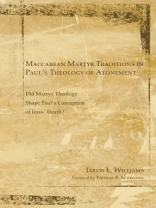In an age in which scholars continue to produce books on the nature and significance of Jesus’s death, books that often assume the Old Testament cult was the New Testament authors’ primary background for their conception of Jesus’s death, Jarvis J. Williams offers a fresh and novel contribution regarding both the nature of and background influences behind Paul’s conception of Jesus’s death. He argues that Paul’s conception of Jesus’s death both as an atoning sacrifice and as a saving event for Jews and Gentiles was significantly influenced by Maccabean Martyr Theology.
To argue his thesis, Williams engages in an intense exegesis of 2 and 4 Maccabees while also interacting with other Second Temple Jewish texts that are relevant to his thesis. Williams further interacts with relevant Old Testament texts and the key texts in the Pauline corpus. He argues that the authors of 2 and 4 Maccabees present the deaths of the Jewish martyrs during the reign of Antiochus Epiphanes IV as atoning sacrifices and as a saving event for Israel. He further argues that, although the Old Testament’s cultic language certainly influenced Paul’s understanding of Jesus’s death at certain junctures in his letters, the Old Testament cult alone-which emphasized animal sacrifices-cannot fully explain why or even how Paul could conceive of Jesus’s death, a human sacrifice, as both an atoning sacrifice and a saving event for Jews and Gentiles. Finally, Williams highlights the lexical, theological, and conceptual parallels between Martyr Theology and Paul’s conception of Jesus’s death. Even if scholars disagree with Williams’s thesis or methodology, serious Pauline scholars interested in the background influences behind and the nature and significance of Jesus’s death in Paul’s theology will want to interact with this work.
Sobre o autor
Jarvis J. Williams is an associate professor of New Testament Interpretation at The Southern Baptist Theological Seminary in Louisville, Kentucky. He is the author of the forthcoming book, The Cross and Racial Reconciliation in Paul’s Theology. Williams lives with his wife Ana and their son Jaden in Louisville, Kentucky, where they are members of Clifton Baptist Church.







![Capa do Brian Schrag & Julisa Rowe: Community Arts for God's Purposes [Chinese] 貼近神心意的社群藝術 Capa do Brian Schrag & Julisa Rowe: Community Arts for God's Purposes [Chinese] 貼近神心意的社群藝術](https://static.worldofdigitals.com/thumb_webp/740/9781645083740.webp)




